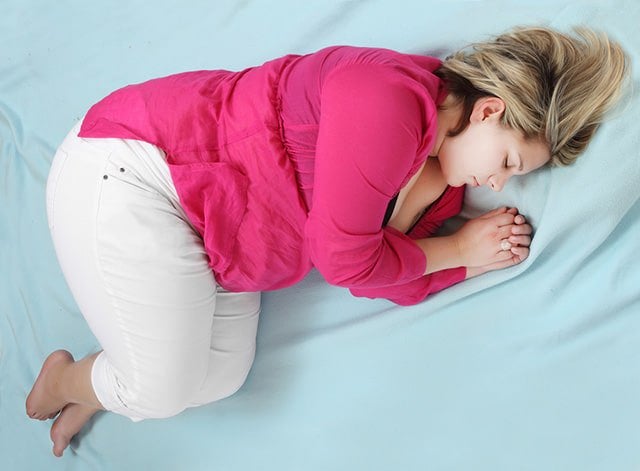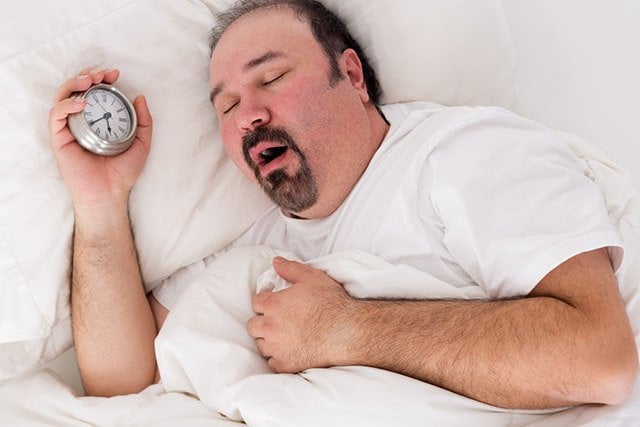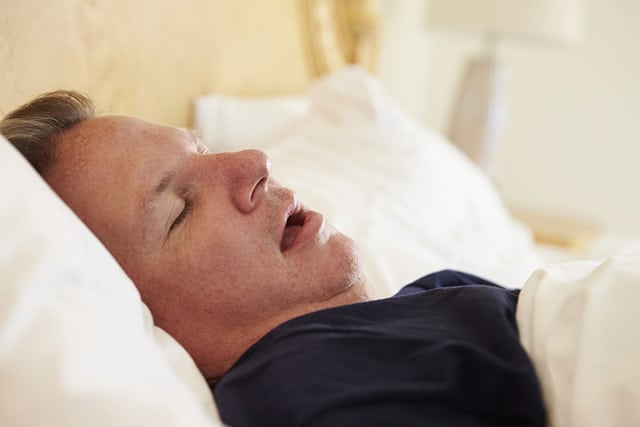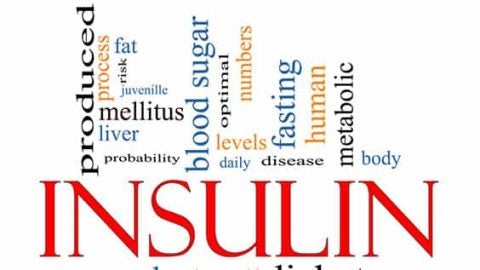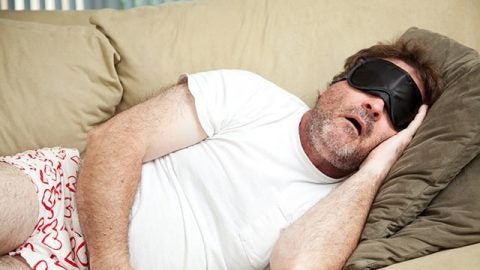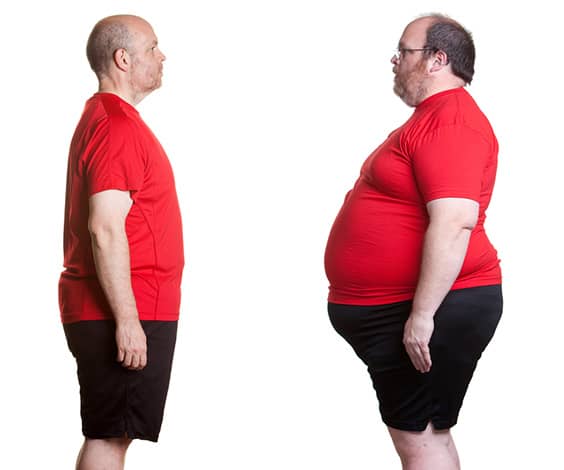According to statistics done by the Centers for Disease Control and Prevention, around 65% of Americans are overweight or obese. From 1980 to 1999, the number of obese individuals, with a BMI of 30+, jumped from 15% to 27%. In 2000, 15% of children from the ages of 6 to 19 were considered to be overweight, making the rate 3 times higher than what it was in 1980.
What’s leading to this alarming jump in weight? One issue that is causing this epidemic is the lack of sleep a lot of individuals are getting. But what exactly is it that links sleep deprivation and obesity?
You may want to read: How Does Sleep Help with Weight Loss?
The Link Between Sleep and Weight
In our society, a lack of sleep is very common. The pressures of work and our social lives are very active, causing adults to get less than 7 hours of sleep per night opposed to the suggested 7-9 for adults and younger adults and 8.5-9.5 hours for teenagers. So what does this have to do with weight gain? Research has suggested that generally, children and adults who don’t get the recommended amount of sleep weigh more than those who get the proper amount.
Over the course of 16 years, the Nurses’ Health Study researchers followed around 60,000 women and asked them about their sleep habits, weight, diet, and other aspects of how they live their lives. At the beginning of the study, all of the women appeared healthy and none showed signs of obesity.
Sixteen years after the initial studies, the women who slept 5 hours or less per night were at a higher risk for obesity. This was compared those who slept the recommended 7 hours per night. Those who slept less had a 30 percent more chance of gaining 30 pounds over the study period.
— Sleep Deprivation And Obesity
There are quite a few ways in which the lack of sleep could cause an increase in weight. One theory is that sleep-deprived individuals may not have enough energy to exercise. This decreases the amount of calories burned. Also, people who don’t sleep enough may end up taking in more calories because they’re awake longer than those who are able to sleep more.
You may be interested in: How Many Calories Do You Burn Sleeping?
This is simply because those who are awake longer, have more chances to eat. Sleep deprivation can also cause a disruption of the balance of key hormones that are responsible for controlling your appetite, making sleep-deprived people hungrier than others.
Relationship Between Sleep Apnea and Obesity
In children, sleep apnea has been linked to excess weight and obesity, which can be associated with the soft tissue in the mouth and throat. At night, during sleep, the muscles in the tongue become relaxed. The soft tissue inside of the throat then causes the airway to become blocked. However, obesity is a less common cause of obstructive sleep apnea in children than it is in adults. It’s certain, though, that being overweight is definitely a high-risk factor for the development of obstructive sleep apnea.
Weight Gain Causing Sleep Apnea?
There are a number of reasons as to why somebody would gain weight. It could be from pregnancy, medications, a change in activity levels or an unhealthy diet changed from a healthy one. There are some body types that have extra weight around the neck, which can be an effect from the weight gain.
Over time, as the weight is added on, certain individuals may find themselves not sleeping as well as they used to, even on the most comfortable of beds. They may find themselves getting up multiple times during the night to use the bathroom or they may even suffer from insomnia. They might even hear some complaints from their partner about snoring, which may be a new development. Chances are that these symptoms are pointing towards apnea.
A Sleep Disorder Associated With Obesity
Obesity and obstructive sleep apnea share common health risks that should not be put on the back burner. Both of these conditions can lead to heart disease, diabetes, stroke, hypertension and other life-threatening health conditions. Sleep apnea leads to obesity simply because of sleep deprivation. This is due to imbalances that make it difficult for the body to maintain its healthy metabolism. The key hormones that are related to weight management are:
— Insulin
When we start losing sleep, it affects our bodies ability to use insulin properly to manage blood sugar. A lack of sleep compromises our insulin levels which lead to our bodies not being able to make efficient hunger-regulating hormones. These hormones are called Leptin.
— Leptin
Our brain is responsible for releasing leptin. This is the hormone that is responsible for telling us that we are full. With fewer of these signals being released due to sleep deprivation, we then turn to overeating. As a result, the ghrelin begins its mass amount of production.
— Ghrelin
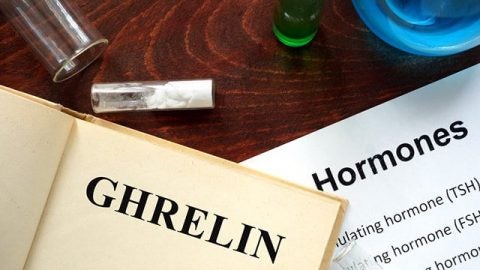
When you’re sleep deprived, your body becomes stressed and wrecks havoc on your hormones, especially the ones mentioned above. This in turn makes our body store calories as fat rather than burning them. This leads to an expanded waistline and worsened sleep apnea. This is then followed by even more sleep issues, leading to more eating and a lower metabolism. When we are in REM sleep, we actually burn more calories. Those who have untreated sleep apnea rarely experience REM sleep, so it becomes another lost opportunity for weight loss and good health.
What Happens If You Lose Weight?
If you take the next step and start losing weight, it can alleviate the symptoms of sleep apnea if the central cause is obesity. For those who lose as little as 5% of their body weight, some relief from apnea can be found. It may be improved so much that the apnea completely disappears. One study showed that ⅔ of patients who were put on a calorie-restricted diet showed improvement in their sleep apnea symptoms.
Losing The Weight Safely
Before you run to the store and grab whatever weight loss supplement you can find, read this section first. If you want to drop a few pounds, here’s how you can do it the safe way. First, you need to remember that you want to lose the weight gradually, not suddenly.
If you drop a bunch of weight too fast, you will lose your bone, muscle, and water instead of the fat. You should aim to lose 1-2 pounds per week and avoid any product that promises to do something to your body that sounds too good to be true.
1. Cut The Calories
I know, it sounds like a stretch, but just hear me out. If you’re thinking that you can no longer eat the foods that you love, you’re wrong. You need to learn the concept of portion control.
All you need to do is cut back on your portions, trim back your usual calorie intake per day, read the food labels to figure out how many calories are in each serving and just drink more water. Drinking water tricks your body into thinking you’re full. It may be in your best interest to substitute high-calorie foods for fruits, vegetables, whole grains and lean proteins.
2. Figure Out Your Hunger Source

3. What To Avoid & What To Eat More Of
Added sugars are the main culprit of empty calories. If you aren’t sure what empty calories are, let me explain. It’s simply a type of food that contains calories with no nutritional value to them. These are items such as cookies, cakes, sugar-sweetened drinks and other items such as those. You should limit your calorie intake to less than 10% for added sugars.
Carbs found in products, such as certain types of bread, are another silent killer. When you decide which ones you want to keep in your diet, make sure they are low on the glycemic index. Choose whole grains and other foods that are high in fiber, iron and B vitamins.
Another way to ensure that your weight is managed properly, cut out liquid calories that are found in soda, alcohol, and juices. Replace them with drinks that have zero calories such as water, unsweetened tea, and black coffee. If you don’t like plain water, enhance it with some lemons, limes, mint or cucumber.
4. Exercise
It’s not as simple as getting on a treadmill, unfortunately. It’s a good idea to team up with a personal trainer who can help you on your journey. If you exercise alone, make sure to change up your routines, try some high-intensity interval training, eat clean and pick up some weights. One study showed that out of 10,500 adults who trained with weights for 20 minutes per day, gained less fat on their belly over a period of 12 years compared those who love cardio.
You may interested in: How Exercise Improves Sleep
Conclusion
Based on the studies and research that I’ve come across, it’s certain that sleep apnea causes obesity to a certain extent. Lack of sleep causes less energy, which means no desire to exercise and there’s also the stress eating and binge eating from lack of sleep.
If you get yourself on a good diet and exercise plan, you may find that your apnea symptoms are being alleviated. Good luck with your journey and if you know anybody who would benefit from this post, please feel free to share.

